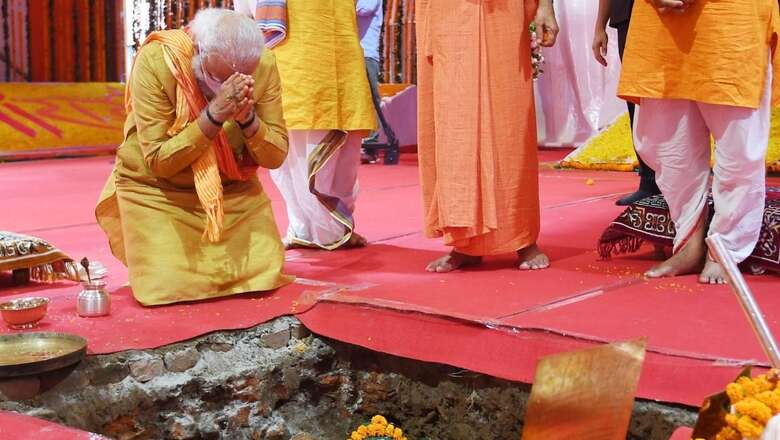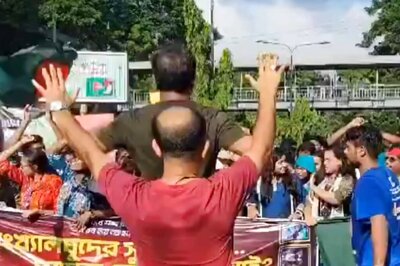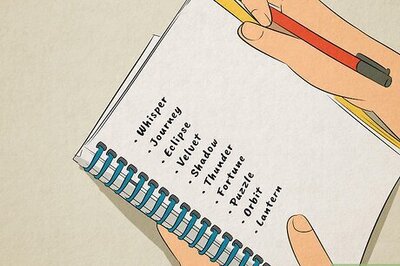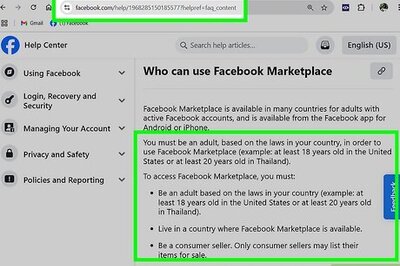
views
नहिं दरिद्र कोउ दुखी न दीना। नहिं कोउ अबुध न लच्छन हीना॥
In the above-mentioned illustrious verses of the Uttara Kanda in Shri Ramcharitmanas, Goswami Tulsidas eloquently paints the vision of a ‘Ram Rajya’, a utopian realm where destitution finds no dwelling, sorrow is a stranger, and poverty is an alien concept. In this divine kingdom, folly is absent, and virtues flourish abundantly.
The notion of Ram Rajya is often deemed unattainable. But it should also be kept in mind that just like in early times when not every monarch was graced by the divine blessings of Shri Ram, in contemporary democratic India, the realisation of such an ideal seems reserved for a chosen few.
Throughout history, whenever the nation faced the encroaching shadows of darkness, saviours emerged—figures like Bukka Raya in Vijayanagar, Kapilendra Deva in Odisha, Jaswant Singh in Marwar, or Shivaji in Deccan—who, endowed with divine blessings, restored order and justice. In this epoch, it appears that Lord Ram has anointed Prime Minister Narendra Modi as his chosen disciple, leading the charge since 2014 to establish a modern-day Ram Rajya.
Just as in the past, when leaders rose under the divine guidance of the lords, it seems like PM Narendra Modi has been entrusted with the sacred task of steering the nation towards prosperity and righteousness. The prime minister and his government are working hard to achieve the vision of a prosperous society, similar to the concept of Ram Rajya. They are focusing on tackling poverty in a comprehensive way, looking beyond just income.
Drastic Reduction in MPI
The recently released Multidimensional Poverty Index (MPI) by NITI Aayog, which considers factors like health, education, and living standards, shows that India has significantly reduced poverty in various aspects over the past nine years.
Around 24.82 crore people have moved out of multidimensional poverty between 2014-2023 reflecting a positive transformation. This progress aligns with India’s commitment to addressing poverty in all its forms, supporting the Sustainable Development Goals (SDGs). Specifically, the efforts made resonate with SDG target 1, aiming to cut poverty in all aspects by half by 2030.
When discussing Shri Ram, it’s imperative to acknowledge the great devotees like Maa Shabari and Nishadraj Kevat, representing the tribal and modern-day OBC communities. In envisioning a Ram Rajya, the empowerment of backward classes and Scheduled Tribes becomes indispensable. The current government has diligently worked towards ensuring that every community stands tall with a sense of empowerment.
Government’s reach-out to Mata Shabari’s community
In addressing the concerns of the tribal community, the government has demonstrated a commitment to preserving their culture and heritage. Initiatives such as Aadi Mahotsav, an annual celebration showcasing tribal art, crafts, cuisine, and traditions, not only instil cultural pride but also create economic opportunities. Additionally, efforts to safeguard tribal languages, art forms, and traditional knowledge are evident in initiatives like the Pradhan Mantri Janjatiya Gaurav Yojana.
The Particularly Vulnerable Tribal Groups (PVTGs), long overlooked, found a supporter in Prime Minister Narendra Modi. In a move to empower 75 PVTGs in November 2023, the government launched Pradhan Mantri PVTG Development Mission, also known as Pradhan Mantri Janjatiya Gaurav Yojana or PM-JANMAN, allocating a substantial budget of Rs 24,000 crore. This groundbreaking initiative aims at holistic development for PVTGs across 18 states and Union Territories. PM-JANMAN is designed to provide PVTGs with essential fundamental amenities, educational resources, healthcare provisions, connectivity solutions, and sustainable livelihood opportunities.
Prime Minister Modi’s commitment to this mission reflects the compassionate and respectful connection akin to Shri Ram’s relationship with Shabari.
Government’s efforts towards OBC Communities
Empowering backward communities, the government is supporting them with their traditional skills through programs like the Pradhan Mantri Vishwakarma Kaushal Samman. This initiative is designed to assist artisans and individuals involved in small businesses. The government will ensure easy loans, skilling, technical support, digital empowerment, brand promotion, marketing and raw materials. The objective of the scheme is to develop traditional artisans and craftsmen while preserving their rich traditions. This initiative aims to enhance skills and craftsmanship among backward communities, not only boosting employability but also reviving businesses reliant on traditional skills that were on the verge of extinction.
A moot point to be noted here is that, for decades, other political parties simply paid lip service to the cause of non-dominant OBCs, who form a considerable percentage of the total population. Non-dominant OBC sub-groups, whether it is non-Yadavs, Kurmis, Koeris or others, were repeatedly let down by other parties. These non-dominant OBCs found their faith in the leadership of PM Narendra Modi, who stood up for them.
The government’s endeavours resonate with the spirit of inclusivity and empowerment. While the path to a perfect Ram Rajya may be long and winding, the progress made under Prime Minister Modi’s leadership, in tackling poverty, empowering modern-day descendents of Mata Shabari and Nishadraj, and upholding diverse traditions, serves as a beacon of hope.
It is sad and shameful that the months preceding the Pran Pratishtha of Ram Mandir saw some of the worst synchronised attacks on Sanatana Dharma by India’s beleaguered Opposition parties. However, we will leave that aside for another day.
For now, it gives us enormous optimism to believe that with PM Modi’s unwavering commitment and continued dedication, India can march steadily towards this utopian ideal, ensuring a future where every citizen thrives in a society steeped in equality, prosperity, and righteousness – ideals which Bhagwan Ram championed several thousands of years ago and which now form the bedrock of Sanatana faith and pride.
Tuhin A. Sinha is the National Spokesperson of BJP, besides being an accomplished author; Nishant Kumar Hota is a public policy consultant. Views expressed in the above piece are personal and solely that of the author. They do not necessarily reflect News18’s views.

















Comments
0 comment